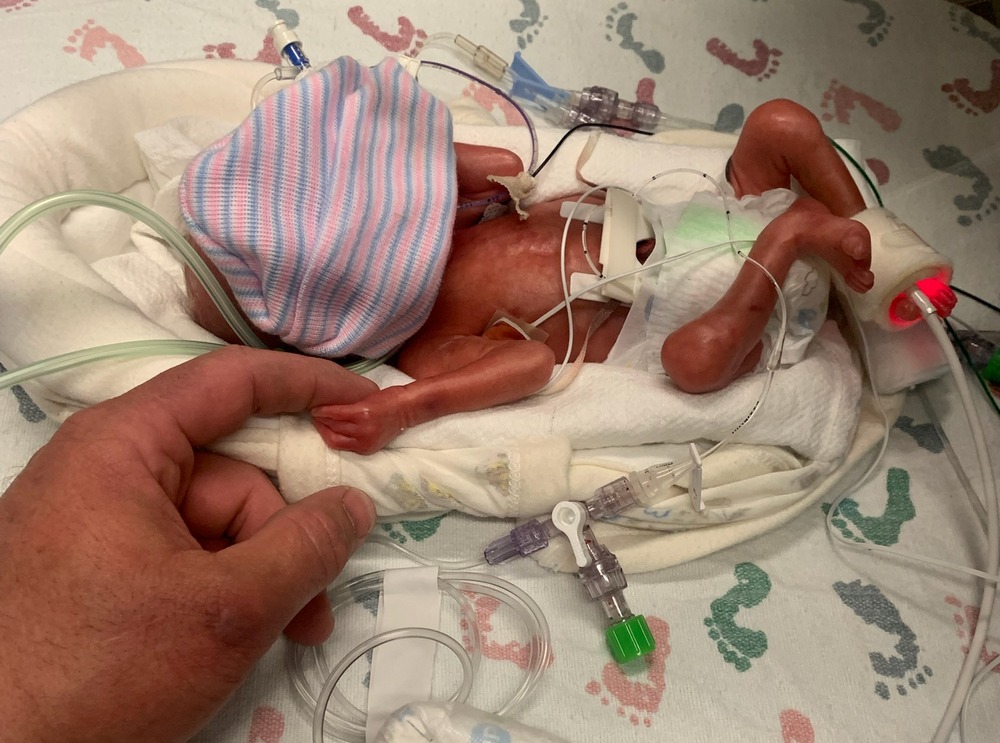![]()

As far as first pregnancies can go, Melissa Haas’ first pregnancy seemed to be a breeze. She was experiencing no nausea, no aches and pains, and was still running, kayaking, and playing volleyball on occasion. In fact, her only issue leading up to the pregnancy was her borderline high blood pressure, which resoundingly dropped when she became pregnant.
“I was really ecstatic that I no longer seemed to have any blood pressure issues with the pregnancy which was weighing heavy on my mind,” Haas said.
All her follow-up checks up went well and everything seemed on track. Until suddenly it wasn’t.
Cut to October 6, 2022, when Haas started to experience a headache that didn’t seem to go away.
“You can’t take certain medications when you are pregnant, so it was becoming tricky to get this one to subside and then it seemed to get increasingly worse and became what I thought was a terrible migraine,” Haas recalls.
A co-worker at the time was also pregnant and experiencing problem headaches and mentioned getting some medication for it so on October 9, Haas called the Women’s Center at Regional West and asked if she could get something for the pain, which at that point was debilitating.
“The provider I spoke with told me she wanted me to come in just in case to make sure we weren’t missing anything,” Haas relayed, “I didn’t go home after that.”
Her blood pressure was taken in the ER at Regional West and after mentioning she was pregnant, at just 25 weeks, she was ushered upstairs to the labor and delivery unit where she was hooked up to magnesium sulfate, a common treatment for high blood pressure during pregnancy.
“Nurses were coming in and out and telling me I was very sick and then there was discussion of flighting me to Denver,” Haas says, “I didn’t feel sick, however, after the treatment I felt just fine and was begging them to let me go home or at least drive myself to Denver.”
A doctor on call said she suspected Haas potentially had pre-eclampsia, a pregnancy complication characterized by high blood pressure, and in fact her blood pressure was so high, reading at 220/117, she was on the verge of experiencing a stroke. A call was made to Presbyterian/St. Luke’s in Denver and that afternoon she was flown to their intensive care/maternity unit. Doctors were puzzled with Haas as she displayed no other symptoms of pre-eclampsia, which includes swelling of the hands, feet, and face, vision changes, pain in the upper right abdomen, and nausea and vomiting.
“They kept telling me on paper I was very sick but when they saw me in front of them, I didn’t look sick at all, in fact I was a little bit grumpy with them because I wanted to get up and move around and they weren’t letting me,” Haas says.
Her baby was monitored for any changes during the period while she was in the hospital and while the baby did not seem to be in distress, Haas was no longer responding to any treatment for the high blood pressure. The decision was made to have an emergency c-section on October 14, with Haas just getting to 26 weeks of pregnancy. Garrett Haas was born at just 1 lb. 14 oz. and spent the next 78 days in the NICU (neonatal intensive care unit) at Rocky Mountain Children’s Hospital.
Garrett is now 2 years of age, and an absolute crazy boy as Haas describes him. She reflects back to that time and hopes she can now spread awareness for women who are pregnant to check their blood pressures regularly and monitor their symptoms.

“I was fortunate in the fact that I was very aware of my blood pressure issues because my job made me aware of it, but I know others might not even think about it,” Haas says.
She stresses that blood pressure checks should be commonplace for pregnant women, even when they aren’t in a doctor’s office.
Panhandle Public Health District (PPHD) Director, Jessica Davies, agrees that blood pressure can be an effective way for pregnant women to monitor their health during pregnancy and that is why she is happy to announce PPHD’s initiative to have blood pressure monitoring available for women who are pregnant.
“We’ve identified this issue through our various programs in the health district, and given the vast distances many residents must travel for OB/GYN care, we see an opportunity for our public health nurses to provide support,” Davies shared. “By providing education and resources, we can help women in our communities monitor their blood pressure and stay informed about their health.”
PPHD will be offering free blood pressure checks in their Scottsbluff office location at 18 West 16th Street during normal clinic hours and have nurses on hand who can help with any questions or concerns that may come up.
PPHD also offers a blood pressure management program to help individuals better manage blood pressure. A Living Well with High Blood Pressure workshop is going to be provided weekly on Thursdays starting March 6 to April 24 at noon via Zoom to help individuals with hypertension manage blood pressure through lifestyle changes. Contact Cheri Farris, cfarris@pphd.ne.gov, for more information.
For further information on PPHD blood pressure initiatives, please visit www.pphd.ne.gov or call 308-633-2866 ext. 216 or toll free 877-218-2490. Panhandle Public Health District is working together to improve the health, safety and quality of life for all who live, learn, work and play in the Panhandle. Our vision is that we are a healthier and safer Panhandle Community.
